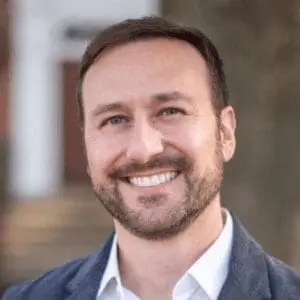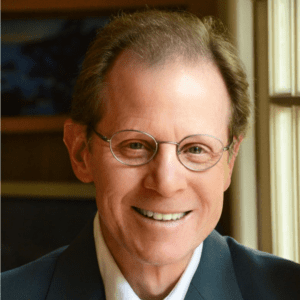We’re used to hearing accusations fly about who—and what—caused the current climate crisis. It’s the oil, gas, and coal corporations; the live-stock farming and deforestation companies; the powerful, rich, selfish profiteers. The accusations land on consumers, too: if you’re buying environmentally unfriendly products and services, you’re the problem.
Psychiatrist, author, and educator Dan Siegel offers a different perspective. A therapist for over 30 years, he’s the executive director of the Mindsight Institute, founding codirector of the Mindful Awareness Research Center at UCLA, and founding editor of the Norton professional series on interpersonal neurobiology.
Without denying the need to act on environmental issues, or the problems inherent in our global economy, he asserts that our current climate crisis is a mistaken identity problem. What’s harming us isn’t “out there.” It exists in our own minds as the belief that we’re separate individuals, when in fact we’re interconnected with one another and the environment.
I talked to Siegel about how the climate crisis is a result of the human mind—and how we can harness the mind to reverse-engineer it, starting with the way we speak and use language every day to construct our sense of self. We discussed the pivotal role mental health practitioners can play in changing how we experience ourselves from separate individuals to integrated and linked relational beings.
Zach Taylor: There’s a tendency in our field to think of the climate crisis as beyond the scope of our practice as therapists. Is it?
Dan Siegel: Climate crisis is very much a mental health issue. Obviously, the effects of climate change affect mental health. But beyond that, the mind that’s created the climate crisis is unhealthy, and we need to address that. Modern culture has forgotten what Indigenous cultures have always known: prioritizing relationships between people and with nature is essential to living a wise, meaningful life. The contemplative practice of meditation has also taught us that we have to be careful about how the mind constructs the self—because the self is much more than the individual.
In the United States, which has spread its message around the world, the mind has constructed a view of the self as equal to the individual. That’s led to all sorts of problems—racism and social injustice, political polarization and misinformation, people’s addiction to screens, and the climate change problem. If I believe the self is the individual and that’s the absolute truth, then the meaning of life for me will be about getting as much stuff as I can for me and my family without regard for my environment. When you add ingroup and outgroup dynamics to this scenario, then I say, “If you’re not in my ingroup, I’m going to ignore you, or—worse—maybe even kill you.” That’s plural individualism where I believe my group is better than your group.
ZT: How has seeing the self as equal to the individual created the climate crisis?
Siegel: We’ve mistaken our own mental life as the sole source of our identity and ignored the relationality of things. Einstein said this separate self is an optical delusion of our consciousness. A hundred years ago, quantum physicists figured out that we’re more like verbs than static nouns—which was the older, Newtonian view. We’re connected in ways you can’t always see with your eyes, despite the modern mind’s noun-like perception of reality. It sees person A here, person B there, and decides persons A and B are separate.
We in the field of mental health have also been susceptible to this view. So much is about self-realization, self-discovery, self-regulation, self-compassion, self this and self that. In the child development field, I encourage people to avoid the term self-regulation and instead call it inner regulation. In the mindfulness world, rather than self-compassion, you can say inner compassion. I know it sounds dramatic, but I believe this self-equals-individual mistaken identity is the curse of modern times and is unwittingly putting the nail in our collective coffin.
ZT: How do we change this individualistic view?
Siegel: I have this funny word I use whenever I can: MWe—a combination of me and we. MWe implies we don’t have to choose between losing ourselves in other people or just being ourselves alone. MWe lets us have both. That’s the essence of integration: you don’t lose the differentiated nature of either “me” or “we.” It’s more of a fruit salad than a smoothie.
Any mental health practitioner can help clients experience this MWe. When you look at research on how self is constructed, it’s clear that language makes a big difference. If I ask, “What are you going to talk about today, Zach?” it will reinforce your sense of being a separate individual. But if I ask, “What are we discussing today?” it expands identity. It can be as simple as that. We can also use a qualifier in front of the word self, saying “my inner self” instead of just “myself.” That modifier is a reminder that there’s another, relational self.
It’s also important to experience self-expanding emotions like awe, gratitude, and compassion. Recently, when I asked Bessel van der Kolk about the key healing ingredient in a study he’d done on psychedelics, he said it was “an expanded sense of self.” We need to help our clients realize that they are their relationships—with family members, neighbors, friends, and more broadly, all of humanity. When we’re grateful for nature, it’s because we sense we’re part of something larger than our individual self. We can encourage clients to go for walks, appreciate a leaf, look up at the sky. I once asked a wildlife photographer, “What drives you?” He said, “Climate change drives me. If the next generation doesn’t fall in love with nature, they won’t try to save it.”
With every client, we have the opportunity to expand their sense of self in a way that creates an internal shift. Whether people get in touch with awareness itself during meditation, use psychedelics and do the integration work, walk in nature and experience gratitude and awe, they’re doing something similar: going beneath the delusion of separation. I’ve surveyed over 50,000 people after guiding them through a wheel of awareness practice, and one of the most common terms people arrive at when they experience pure awareness is “love.” This feeling of love is the deepest teaching in all the world’s major religions. It’s a word we’re not supposed to use in the mental health world, but how can you ignore it, even from a scientific point of view? Love links us. We need to realize that in some ways, love is the thread the universe is made of.
ZT: How can therapists help people stay connected to that thread, particularly when clients come in anxious because the environment is in a state of collapse?
Siegel: We need to help people move from a threat mind state to a challenge mind state. Climate activists who have the courage to care are burning out, and it’s because they’re seeing the lack of progress when it comes to climate as a threat to existence. But here’s the issue: if the human mind sees something as a threat, it mobilizes the threat reaction: fighting, fleeing, freezing, or fainting—collapsing into helplessness. Those reactions are a recipe for burnout. When we’re reactive, we shrink what we consider the in-group to be. We operate from an insufficiency mindset that’s the opposite of compassion and gratitude.
So instead of crying out, “Oh my God, what’s the latest threat today?” we can say, “What’s the challenge today, and how do I make it my dance partner?” I’m not suggesting we need to be a Pollyanna about this. We’re facing huge challenges. But the great news is that the human mind, because it’s causing these challenges by constructing itself as separate, can change them by experiencing itself as relational and interconnected. I’m optimistic about our ability to turn things around. The bigger question is, will we?
ZT: Not knowing the answer to that question can be discouraging for a lot of people.
Siegel: It can. But we can be part of the answer by confronting climate challenges and improving things now. And while that direction aims for a destination, we can’t get obsessed with the destination. If we do, we’re going to fret that we’re never going to get there. If you fixate on an outcome, whatever you do right now won’t be enough. You’re going to take a fatalistic view, burn out, and say, “This isn’t working.”
We have to do this work together. It’s not a solo job. And we may as well have fun doing it! I once heard somebody ask the Dalai Lama, “What’s wrong with you? You’re laughing and joyful while there’s so much suffering in the world. How can you laugh?” Without missing a beat, he responded, “It’s not in spite of suffering that I laugh and try to be joyful. It’s because of suffering—otherwise suffering will have won.” Having fun while meeting challenges isn’t disrespectful. It’s an antidote to suffering. We need to bring joy to hard moments. We have a responsibility to bring joy, love, and fun into the way we live.
ZT: What practices can help therapists do that?
Siegel: A regular loving-kindness meditation practice can help. When a person connects with an authentic intention like “May I be happy” or “May we be happy,” research shows it spreads around the brain, just like when someone improves their piano playing by imagining themselves doing scales. Humanity needs to make sure we’re shaping our intentions in an extended-self way. And that’s what loving kindness statements do.
ZT: Do you have any advice for therapists navigating this intersection between their work and climate change issues?
Siegel: I want to inspire and empower mental health practitioners. I think we’re going to be the army of people who take up leadership opportunities related to this issue and make a huge impact.
One good thing about this climate issue—if you can imagine anything being good about it—is that it might be the big wake-up call we need to get us out of this nightmare we didn’t even know we were creating. That doesn’t mean it’s easy to make changes, but I can’t think of a better profession than ours to take on these ideas, and to use the skills and methods we’ve learned to invite people to wake up from our delusion of separateness.
ILLUSTRATION © PREMIUM GRAPHICS
Zachary Taylor
Zach Taylor, MA, LPC, is the Director of Psychotherapy Networker. He frequently interviews the field’s top experts and is among the hosts of the annual Psychotherapy Networker Symposium, which is the largest and longest running annual gathering of psychotherapists in the world. In addition, he manages CE trainings and programs for PESI, Inc., Networker’s parent company. Prior to joining Psychotherapy Networker, he spent 10 years in practice specializing in anxiety and panic disorders. His mission is to support psychotherapy professionals and develop future trainers and trainings to improve outcomes for their clients. He currently lives in Eau Claire, WI.
Dan Siegel
Longtime Psychotherapy Networker contributor Daniel J. Siegel, MD, is a graduate of Harvard Medical School and completed his postgraduate medical education at UCLA with training in pediatrics and child, adolescent, and adult psychiatry. He is currently a clinical professor of psychiatry at the UCLA School of Medicine, founding co-director of UCLA’s Mindful Awareness Research Center, founding co-investigator at the UCLA Center for Culture, Brain and Development, and executive director of the Mindsight Institute, an educational center devoted to promoting insight, compassion, and empathy in individuals, families, institutions, and communities. Dr. Siegel’s psychotherapy practice spans thirty years, and he has published extensively for the professional audience. He serves as the Founding Editor for the Norton Professional Series on Interpersonal Neurobiology which includes over 70 textbooks.














